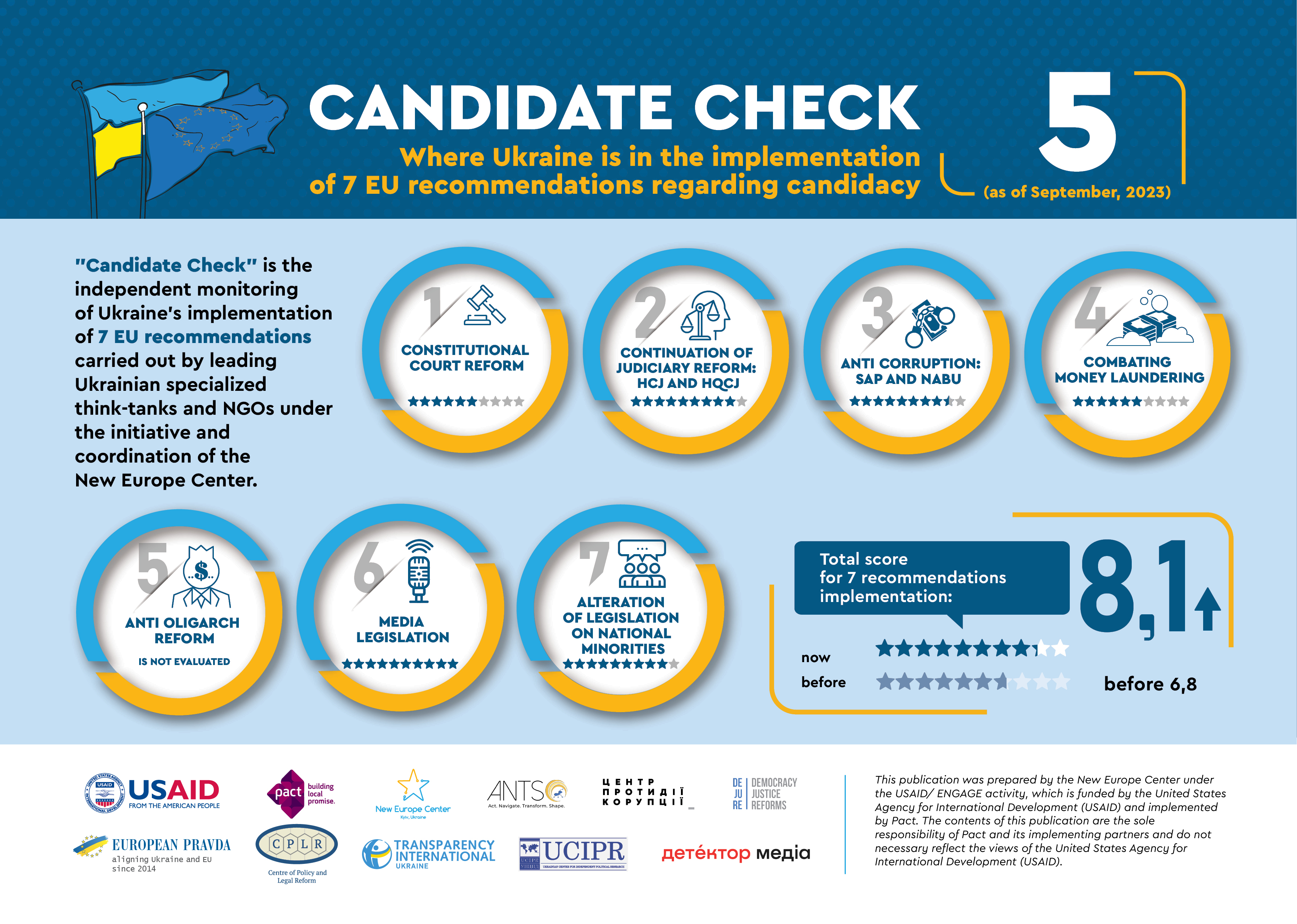
More than a year has passed since Ukraine received EU candidate status with a number of recommendations to be fulfilled for further promotion to membership.
The New Europe Center in partnership with a number of specialized Ukrainian think-tanks and NGOs carried out the fifth independent monitoring of Ukraine’s implementation of EU recommendations.
Please find the results of the “Candidate Check-1” (as of August 17, 2022) here, “Candidate-Check-2” (as of November 8, 2022) here, “Candidate Check-3” (as of February 1, 2023) here and “Candidate Check-4” (as of May 4, 2023) here.
OVERALL SCORE: 8.1 points (was 6.8).
Experts’ scores (on a 10-point scale):
- Reform of the Constitutional Court of Ukraine – 6 points (was 2)
- Reform of High Council of Justice (HCJ) and the High Qualification Commission of Judges of Ukraine (HQCJ) – 9 points (was 8)
- Anti-corruption: SAP (Specialized Anti-corruption Prosecution) and NABU (National Anti-Corruption Bureau of Ukraine) – 8.5 points (was 8)
- Combating money laundering – 6 points (the score has not changed)
- Anti-oligarch reform – not rated (was not rated)*
- Media legislation – 10 points (was 9)
- Legislation on national minorities – 9 points (was 8)
*Please note the change in the evaluation methodology! Since Ukraine received seven recommendations in June 2022, the implementation of Recommendation № 5 (anti-oligarchic reform) has been effectively frozen due to the absence of the Venice Commission’s conclusion.
Only in June 2023 did the Venice Commission adopt a conclusion regarding the ‘anti-oligarchic law,’ which goes far beyond the scope of the law under consideration and recommends a comprehensive reform of the competition sphere, which cannot be implemented in a matter of months.
In view of this, in ‘Candidate Check-4,’ the panel of experts decided to suspend the evaluation of the ‘anti-oligarchic’ recommendation and called on the European Commission to clarify the criterion. Since then, there have been no changes, and all the arguments of the panel of experts remain relevant. Therefore, the panel of experts withdraws the evaluation of Recommendation № 5 and urges the European Commission and EU member states not to consider it in assessing Ukraine’s progress.
Summary of the implementation of 7 EU recommendations by the New Europe Center:
Over the course of more than a year, Ukraine has demonstrated significant progress in implementing 7 EU reforms, with an average expert score of 8,1 out of 10.
Recommendation №1. Reform of the Constitutional Court of Ukraine. The necessary legislation has been adopted. Experts from the “Candidate Check” coalition are monitoring its implementation. The next step is the implementation of new procedures for selecting judges of the Constitutional Court. The expert score has increased from 2 to 6 points.
Recommendation №2. Reform of the High Council of Justice (HCJ) and the High Qualification Commission of Judges of Ukraine (HQCJ). The High Council of Justice has resumed its work, and formation of the composition of the members of the High Qualification Commission of Judges of Ukraine has been finalized. Experts confirm the technical implementation of the EU recommendation. Score – 9 points (an increase of 1 point).
Recommendation №3. Anti-corruption: SAP (Specialized Anti-corruption Prosecution) and NABU (National Anti-Corruption Bureau of Ukraine). NABU, SAP, and High Anti-Corruption Court of Ukraine continue to support the previously high activity in cases of top-level corruption. After a wave of criticism, electronic declaration of public officials has been restored with an amendment regarding public access to declarations. Some reservations still persist among experts. Score: 8.5 (a slight increase).
Recommendation №4. Combating Money Laundering. Reservations persist regarding legislation concerning the status of politically exposed persons (PEPs). In the enforcement sector, the President has approved a Comprehensive Strategic Plan for the reform of the law enforcement system for 2023-2027, but its weak point is that it was consciously developed for peacetime conditions. Approval of the Action Plan for implementing this document is pending. The expert score remains unchanged (6 points).
Recommendation №5. Anti-Oligarch Reform. The Venice Commission refrained from giving its opinion for a long time, which prevented the beginning of EU recommendation implementation by Ukraine. Only in June 2023 did the Venice Commission provide a conclusion that goes far beyond the scope of the discussed law. The expert panel urges the European Commission and EU member states not to consider this recommendation in evaluating Ukraine’s progress.
Recommendation №6. Media legislation. The media law was adopted last year. Changes to the advertising law were made in May. The recommendation has been implemented. Score – 10 out of 10.
Recommendation №7. Legislation on national minorities. Changes have been made to the law on national minorities (communities). Some of the remarks of the Venice Commission have been taken into account. Implementation mechanisms of the law are needed. Approval of the State Target Program “Unity in Diversity” is expected. Experts highly evaluate the implementation of the recommendation – 9 out of 10.
The New Europe Center would like to express gratitude to partners who participated in the second independent monitoring of EU reforms implementation:
- National Interests Advocacy Network ‘ANTS’
- Anti-Corruption Action Center ‘ANTAC’
- DEJURE Foundation
- European Pravda
- Centre of Policy and Legal Reform (CPLR)
- Transparency International Ukraine (TI)
- Ukrainian Center for Independent Political Research (UCIPR)
- Detector Media
Experts involved:
- Mykhailo Zhernakov, Nestor Barchuk (DEJURE)
- Roman Smaliuk, Eugene Krapyvin (CPLR)
- Olena Halushka, Anton Marchuk (ANTAC)
- Oleksandr Kalitenko (TI)
- Serhii Sydorenko (European Pravda)
- Yulia Tyshchenko (UCIPR)
- Hanna Hopko (ANTS)
This publication was prepared by the New Europe Center under the USAID/ ENGAGE activity, which is funded by the United States Agency for International Development (USAID) and implemented by Pact. The contents of this publication are the sole responsibility of Pact and its implementing partners and do not necessary reflect the views of the United States Agency for International Development (USAID).














